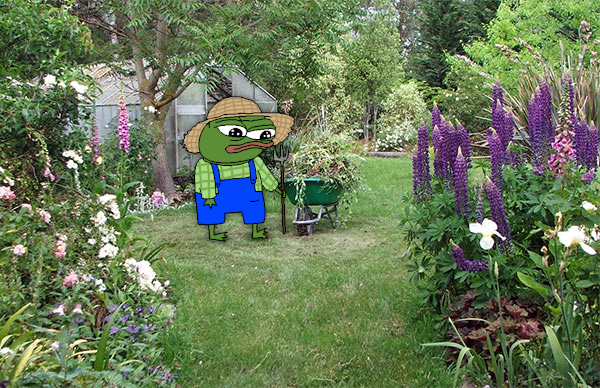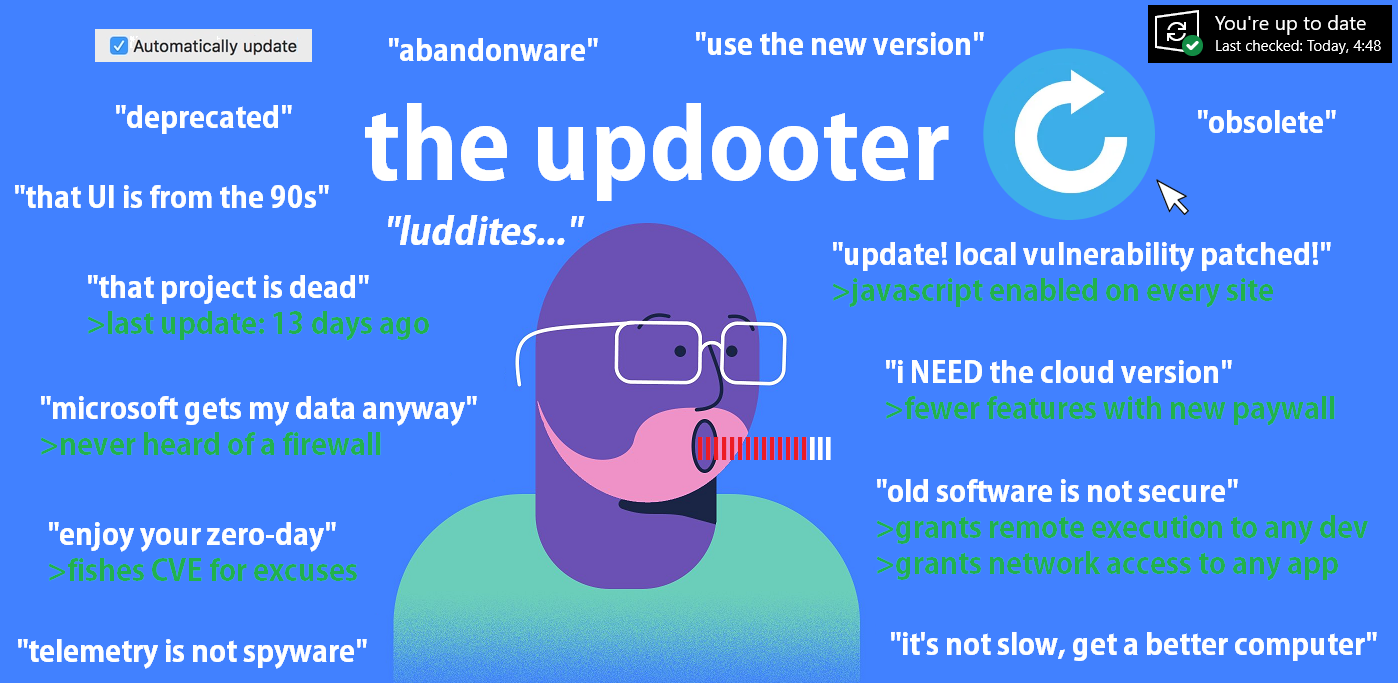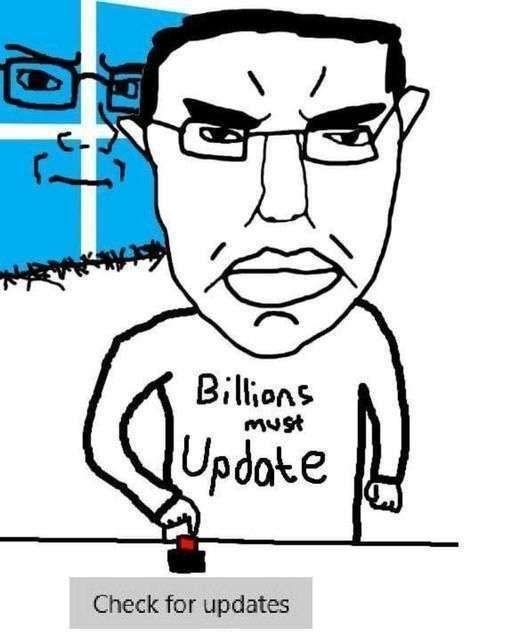
Welcome to the CozyNet Blog!
The PC Desktop is complete!

Click for full size
I believe that the PC Desktop from outside my niche use of it is largely over. And by PC Desktop, I mean it in its most traditional and original concept. You have a physical computer that sits on a physical desk connected to a physical keyboard, mouse, and perhaps a few other devices like a printer, speakers, scanner, camera, etc. Oh and plus YOU own it; you can do whatever you want with bad mamma jamma!
The two major operating systems in use on PC’s today, MS Windows and MacOS, are unrecognizable to me as a Personal Computer Operating System. I don’t even think they should be considered as such given how hostile toward the personal computing concept and dependent on centralized network services they’ve become. They’re essentially a hybrid thin client OS whilst a truly Personal Computer OS is something of a rarity anymore. It’s why I ditched Windows for Debian back in the Windows 8 days; it just stopped being my computer.
I could certainly install the software I wanted on it, and this is still within the realm of possibility on newer versions, but it isn’t going to be very possible for much longer as x86 based architecture and the win32 API are no longer supported or mainstream from a PC perspective. From either major operating system, there’s a heavy emphasis on web based services and this entitled attitude of “you’re going to accept what we shove in your face or else we’ll make your life here miserable.” It’s obviously manipulative behavior and I don’t appreciate the gaslighting from these corporations either.
All I want is my computer back, and I thought I’d found that in the Linux Desktop Operating System ecosystem. For awhile there spanning between 2010 to 2019’ish, things seemed pretty alright, but I’ve began to notice that same sort of manipulative “we know better” self-righteous attitude growing among many of the OSS / FOSS developers too. Mutual respect between developers and their user base, regardless of their social and cultural differences, has quickly become a lost virtue transformed into a cry baby bitch bawl circling around the toilet drain of muh feefees and muh pronouns and muh bullies and muh this and muh that. Hooowaahhh poo lil me, *sniff sniff grift grift,* donate to me plzz!
There’s no doubt this side of software development and programming attracts a certain crowd of people, namely narcissists that excuse their poor attitudes and behavior under a victim-hood complex or “activism;” but this wasn’t really the case by and large from what I can recall within the scene until lately. I’m sure the present political climate has had a large part to play here, but the last thing I want to see and hear is some finger wagging dysgenic puke overlording my computer with their needless opinions on how it ought to work, and likewise a mob of pretend-users trying to shame a project into self destruction over childish kneejerk reactions. I got away from Windows exactly because of that attitude, and now it seems to be taking off here as well!
It’s disappointing, but also a sign of the times for the Personal Computing ecosystem. As I said earlier, it’s largely over. The normies have already moved on well over 10 years ago to mobile platforms and ditched the PC altogether, so anything new and novel or of any worth isn’t happening here. The only people remaining are office wagies, gaymers, boomers and enthusiasts (a fancy term for autists.) I guess I count in that enthusiast category, because I quite like my PC. It does everything I need it too, and affordably! Maybe just a little in the boomer category too. :^)
So with all of that in mind, I think it would be apt for a change in mindset for those enthusiasts remaining when it comes to the expectation of new and improved, or even progress made in this space. Remember, it’s over. There’s no more new, improved, or progress made; it’s finished and complete. There are certainly new projects and new software still being made and introduced, but much of that effort is vain attempts to recreate things that in all likelihood already existed in a much superior form or version. For example, how many times do note taking applications need to be reinvented when there were already good enough, if not even better applications out there made years if not decades ago?
The same concept can be applied to just about every aspect of the PC operating system and the available software for it. Rather than endlessly chasing after the “new” and “improved,” why not settle with that you’ve got? What exactly is your purpose or need in a PC anymore if you’re always chasing for something newer? Maybe it’s time to move on if you’re one of those types.

For myself, I like my PC because I prefer this method of interaction when writing, making music, making frog memes, editing pictures, chatting with people, watching my collection of movies and shows or listening to music. My habits here haven’t changed much over the past 15 years, but the software has. Rather than winamp, it’s audacious with the same skin. From Media Player Classic to MPV. From Firefox to Brave (which is sad, RIP FF.) Movie Maker to Kdenlive. Pirated version of Photoshop to GIMP. Pirated version of MS Office to LibreOffice. From IRC to MSN Messenger, then Steam chat, then back to IRC (and XMPP). From Ventrilo to Mumble. From .txt files to keepassxc (lel).
I’ve come to a realization that most of the software I use can simply remain static with some exception for internet based applications; but even the web is pretty much dead too with the only good parts being independent sites, so maybe a browser isn’t all that important anymore? One of the annoying aspects of Linux desktops is how difficult it is to run older applications, unlike Windows, however it’s possible thru containerization. Now get this, and this might be the same for you too; the applications that I use which require frequent updates and security patches is considerably far and few while all the rest of everything else that I use doesn’t. This even extends to the desktop environment itself and its core services and programs.
So I ask, what is the point in updating these things in a time where many of the projects and developers are becoming incompetent or hostile toward their users and appeasing of corporate dictates? Why should I bother with the “new” and “improved” way of things when what I’ve got is good enough? In fact, there are likely even older nearly forgotten relics of software out there that’s still completely functional if properly containerized and made possible to run today.
I use to think that people still daily driving Windows XP, and to some extent Windows 7 too, were a bunch of nut cases asking to get hacked; but the reality of it is that isn’t really the case. Now sure, you’re an absolute tard to daily drive XP on the internet with some old ass version of Firefox and expect to be able to access modern services with it; and I’m sure most of those guys realize that and have either concocted an elaborate work around or just divide their work between different devices. I’ve gradually come to the same mind in realizing that I don’t have to subject my interaction with my personal computer to the whims of petty tech tyrants. Their projects and bad opinions are now irrelevant and no longer needed, and at any time I can simply halt the “progress.”

I might not be aware if this is already a thing or not, but I can already see a potential underground of old software distribution, like GOG (Good Old Games) but for abandonware. I’ve managed to keep a lot my old installers, but found archive.org to be a good source for old usable software too. Perhaps some sort of package repo for containerized abandonware would be pretty neat! I can foresee loicense issues developing out of it, so it would need to remain anon and accessible from hidden networks; but then you’re asking for all sorts of malware distribution too since there wouldn’t be any accountability on the maintainers. I don’t really know how to approach such an idea. I think Lutris’s approach to Windows game installer scripts would be the way to go, but then a “know your user” and buddy-buddy gatekept ecosystem could work just as well.
I still have a computer that’s incidentally become a time capsule of 2012 running Windows 8.1. I use it strictly for music production, and nothing else. The update services and Microsoft gloware have been removed, and a block to the WWW placed on it with only limited access to my NAS. It’s worked smoothly since! I have another desktop running Ubuntu 16.04, which can surprisingly still be daily driven thanks to a backport of flatpak, but I really only use it for playing old 3Dfx voodoo games in Wine (which is some old compiled version that I found worked best with them.)
Right now my main computer is a Dell laptop that I special ordered back in 2019. It’s been good to me, but I soon plan to return back to one of my desktops now that I’ve got muh house and settle with a nice desktop environment and Linux distribution to begin the process of permanentization. This will involve a self hosted mirror of likely the Debian package repo because those aren’t indefinite; it would make for a cool project too!
I also wanted to mention something else which is a little off-topic but related. About seven’ish years ago I realized that video games were getting really crappy and unoriginal. I eventually stopped buying newer games and only ever bought older games since they were often superior in almost everyway, aside from the graphics (although I love the old surreal early 3D graphics.) It was from that moment on that the library of great and awesome video games was suddenly realized, and how there was no need to ever buy anything else new ever again. You could literally spend a life time playing all the good old games, which is why I had to quickly distance myself from them. It was too much! I’ve had this same sort of revelation too with not just my computer, but even with living life in general as well. Ceaselessly chasing after “new” and “improved” is really a massive delusion pleasantly wrapped up in the label of progress, and is truly an artifact of the Bernay’s-ian era of market propaganda that was instilled and generationally passed down as a societal virtue.
“The conscious and intelligent manipulation of the organized habits and opinions of the masses is an important element in democratic society. Those who manipulate this unseen mechanism of society constitute an invisible government which is the true ruling power of our country. We are governed, our minds are molded, our tastes formed, and our ideas suggested, largely by men we have never heard of…. It is they who pull the wires that control the public mind.” - Propaganda, Edward Bernays
Thanks for reading my blog!
Date: 2024-01-24
Back to top!
Comments:
-
Jan 25, 2024
Permalink
Reply
-
Feb 5, 2024
Permalink
Reply
-
Feb 5, 2024
Permalink
Reply
 Blog
Blog Videos
Videos Music
Music Links
Links Contact
Contact About
About Homepage
Homepage RSS feed
RSS feed Guestbook
Guestbook IRC
IRC